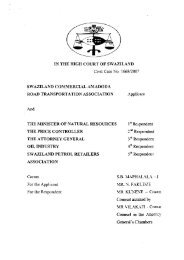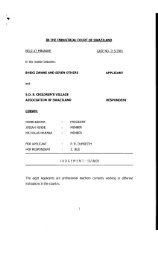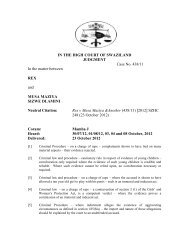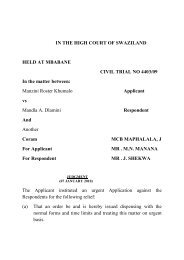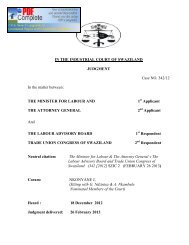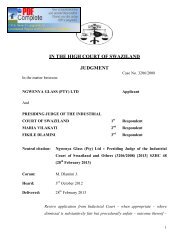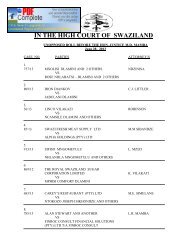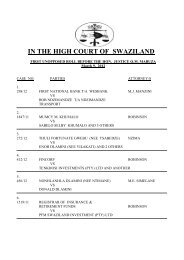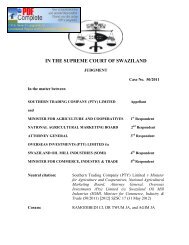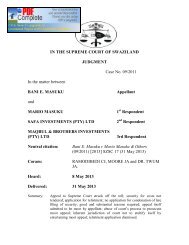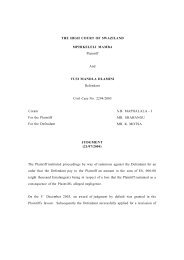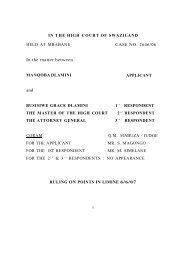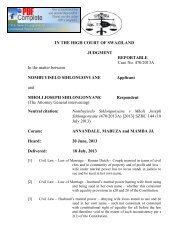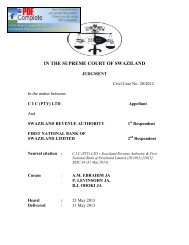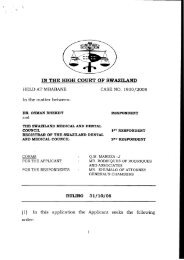Jabulile Khanyisile Nxumalo vs Building Society.pdf - SwaziLII
Jabulile Khanyisile Nxumalo vs Building Society.pdf - SwaziLII
Jabulile Khanyisile Nxumalo vs Building Society.pdf - SwaziLII
You also want an ePaper? Increase the reach of your titles
YUMPU automatically turns print PDFs into web optimized ePapers that Google loves.
IN THE SUPREME COURT OF SWAZILANDJUDGMENTCase No. 80/2012In the matter betweenJABULILE KHANYISILE NXUMALOAppellantandSWAZILAND BUILDING SOCIETYRespondentNeutral citation:Coram:<strong>Jabulile</strong> <strong>Khanyisile</strong> <strong>Nxumalo</strong> v Swaziland <strong>Building</strong><strong>Society</strong> (80/2012) [2013] SZSC 28 (31 May 2013)RAMODIBEDI CJ, MOORE JA and DR. TWUMJA.Heard: 15 May 2013Delivered: 31 May 2013Summary:Appellant sourced and obtained loans from respondent; appellantmortgaged immovable property to respondent to secure due repayment ofloans; appellant defaulted in debt repayments; respondent issued writ ofsummons plus declaration to enforce debt repayment. Notice ofapplication for summary judgment served on appellant; appellant failed tofile affidavit to resist summary judgment; application dealt with whencalled and summary judgment entered in favour of respondent. Neitherappellant nor her attorney in court; appellant does not show bona fidedefence to claim; appellant appeals against summary judgment; allegesbreach of audi alteram partem rule – counsel abandons appeal duringhearing; appeal dismissed on merits; costs to respondent.
JUDGMENTDR. TWUM J.A.IntroductionThis is an appeal from (1) the summary judgment entered by HerLadyship, Ota J. (as she then was), against the appellant in favour ofthe respondent on 7 th September 2012, and (2) the order of the courtdated 24 th October 2012 presided over by Annandale J. refusing to setaside that summary judgment.[1] On or about 30 th August 2008, the respondent, as lender, entered intoa written agreement with the appellant as borrower, whereby it loanedan initial amount of E171, 000.00 to the appellant upon the followingterms:-(i)(ii)(iii)The loan was repayable over a period of 10 yearsInterest was exigible at the rate of 14% per annum.The first of the loans was to be paid by monthly instalment ofE2656.00 each.2
(ii)Interest on E1 822,218.28 at the agreed rate of 8% per annumfrom the date of issue of the summons to the date of finalpayment.(iv)(v)CostsDeclaring Lot No 92 situate in the Tubungu Township Districtof Manzini held by the Mortgager under Deed of Transfer No.885/2008 dated the 12 th November 2008, executable.The application was supported by an affidavit in proof of SummaryJudgment sworn to by the respondent’s Managing Director – MrTimothy Robert Nhleko. It was listed for hearing on 10 th August2012. On that day it was adjourned to 7 th September 2012, at therequest of attorneys instructed by the appellant to enable her file anaffidavit resisting the summary judgment application.The matterduly appeared on the cause list for the High Court sitting in thepremises located at the Mbabane Magistrate’s Court. The hearingdate was 7 th September 2012, as previously agreed.[6] When the High Court started its business for the day, neither theappellant nor her attorneys were in court. Eventually the matter wascalled for hearing. The appellant had not filed any affidavit resisting4
appellant in court on 10 thAugust 2012 and had succeeded inpersuading the court to postpone the hearing of the application forsummary judgment to 7 th September 2012 to enable the appellant tofile an affidavit resisting the summary judgment application, when thematter was called for hearing on the adjourned date, they were late inattending court. They finally arrived a considerable time after theapplication for summary judgment had been called and granted. As ithas been pointed out above there was no opposing affidavit on recordas they had promised to do on 10 th August 2012. The appellant wasalso not present. Perhaps, the appellant took umbrage at their defaultand withdrew her authority on 8 th October 2012. Attorneys Malingaand Malinga withdrew as attorneys of record representing theappellant.[11] After the withdrawal of Attorneys Malinga and Malinga, the appellantappointed, Nzima and Associates as her attorneys on 8 thOctober2012. These new attorneys prepared the Notice of Motion under aCertificate of Urgency to have the summary judgment rescindedand/or set aside. When that application was refused, these attorneys8
filed the Notice of Appeal as well as the Appellant’s Heads ofArgument on 6 th May 2013.[12] The appeal was scheduled to be heard on 15 th May 2013. However,on 14 th May 2013, Attorneys Nzima and Associates filed Notice ofWithdrawal as Attorneys of Record and on the same day, S.C.Simelane filed Notice of Appointment and Substitution of Attorneys.It was Mr S. C. Simelane who ultimately appeared on behalf of theappellant during the hearing of the appeal.[13] There is no doubt in my mind that this rapid turn-over of appellant’sattorneys unsettled her and blurred her perception of the legitimacy ofher defence to the respondent’s case against her. At the very least, itmust have compounded her problems and goaded her to file an appeal.[14] The quintessential claim put up by the respondent against theappellant in the court a quo was a demand for the payment of the sumof E1 822 218.28 which it had loaned to the appellant under a seriesof loan agreements. Copious documentary evidence was provided asannexures to the respondent’s Founding Affidavit. There was no iota9
of evidence by the appellant that she did not receive those loans fullydocumented in the respondent’s evidence. Indeed, in paragraph 8 ofher Founding Affidavit in support of her own application to have thesummary judgment rescinded or set aside, she admitted that she tookthe loans to build a house which was then ready for occupation andthat if she got a tenant to rent it, she could get about E10, 000.00 permonth rental which she would deposit with the respondent inrepayment of the debt.[15] Notwithstanding the contents of paragraph 8 of her FoundingAffidavit referred to above, the appellant claimed that she had a goodand bona fide defence to the respondent’s claim and that she was notindebted to the respondent in the sum of E1 822 218.28, or at all.According to her, the respondent rather owed her the sum of E170000.00 on account of retention money which the respondent hadwrongfully withheld from her, even though the respondent hadexplained with documentary proof to her that the retention moneybelonged to the contractor, as security for executing the buildingcontract in a workmanlike manner. If there was no complaint abouthis work, the retention money was payable to him, not the appellant.10
[16] One major ground of appeal was that the summary judgment wasprematurely entered against her in her absence.In my view that statement is false, disingenuous and even malicious.[17] This defence cannot avail the appellant. The record shows that theappellant’s new attorneys, Malinga and Malinga appeared in court on10 th August 2012 and applied for an adjournment of the applicationfor summary judgment from 10 th August 2012 to 7 th September 2012to enable her file an affidavit resisting the application. This wasacceded to but on the adjourned date, the appellant had not served orfiled any such affidavit. Indeed on the 7 th of September 2012, neitherthe appellant nor her counsel was in court when the matter was called.In a subsequent application filed by the appellant to set aside orrescind the summary judgment, the appellant said her attorney waslate in going to the court and that when he got there the matter hadalready been called and disposed of. That was no good reason, in myview, for the court a quo to have acceded to her application to havethe summary judgment rescinded or set aside.The summaryjudgment complied fully with Rule 32 of the High Court Rules. It11
was regularly obtained. It was not prematurely entered. The recordshows that she was truly a delinquent debtor. This ground of appeal isaccordingly dismissed.Fair Hearing – audi alteram partem[18] In paragraph 9 of her Heads of Argument the appellant argued that hermain contention was that she had been denied her constitutional rightto be heard. She claimed that the principles of audi alteram partemwere not applied by the court.That is how it came about thatsummary judgment was entered against her.[19] A cursory reading of the grounds of appeal reveals that no suchground was noted in the Notice of Appeal. Rule 7 of the Court ofAppeal Rules, 1971, provides that “the appellant shall not, without theleave of the Court of Appeal, urge or be heard in support of anyground of appeal not stated in the notice of appeal, but the Court ofAppeal in deciding the appeal shall not be confined to the grounds sostated.”12
[20] I was minded to ignore the appellant’s resort to the constitutionaldefence in view of the fact that it was not posited as a ground ofappeal. That notwithstanding I have waived the non-compliance. Iwill deal with the ground based on the audi alteram partem rule toadvance the jurisprudence on fair hearing.[21] Now, what procedural safeguards does the audi alteram partemprinciple provide for litigants in court. First, section 21 (1) of theConstitution of the Kingdom of Swaziland, 2005, provides that in thedetermination of civil rights and obligations or any criminal charge, aperson shall be given a fair and speedy public hearing within areasonable time by an independent and impartial adjudicatingauthority.[22] There is no evidence before the Court that the High Court thatadjudicated on the appellant’s matter was not independent or that thejudges were biased against her. On the contrary, it will be recalledthat when appellant’s attorneys pleaded for an adjournment to enablethe appellant to file an affidavit resisting the summary judgmentapplication, it was acceded to and the matter was adjourned from 10 th13
August 2012 to 7 th September 2012. The truth is that come 7 thSeptember, 2012 and no affidavit had been filed and the attorneyswere late to court. The appellant herself was absent.[23] There are two great central principles, “audi alteram partem” and“nemo judex in causa sua” inherent in the concept of natural justice.The requirements of natural justice must depend on the character ofthe decision-making body, the kind of decision it has to make and thestatutory or other framework in which it operates.[24] In court proceedings, the rules applicable are published in the Rules ofCourt for the benefit of all – lawyers, litigants, judges and evenordinary members of the society.The Latin tag, “audi alterampartem” means hear both sides before making a decision. To be ableto do this, other sub-rules must be in place. In particular:-(i)Notice of the proposed hearing of any matter must be publishedin sufficient time for the information of lawyers, litigants andeven other members of the public.14
(ii)The principle requires that the court should hear both sides incourt (except in special circumstances) before making abinding determination of the parties’ rights and obligations.(iii)The courts’ business is published in the court’s roll. That giveslitigants opportunity to prepare their defence or answer. It alsogives litigants the right to respond to allegations, both fair andfoul, and give evidence to disabuse the minds of theiradversaries; either by themselves or by their witnesses. Thisincludes the right to be cross-examined and to cross-examinethe adversary or his witnesses.(iv)Parties are also to be afforded opportunities to make finalsubmissions or addresses both on the facts and the law to thecourt.(v)Most importantly, all these must happen within the publicsitting hours of the court.[25] In the case before this Court, Rule 32 of the High Court Rules wasfairly applied. The appellant complains that when her attorneys failedto file the affidavit and also turned up in court late, somehow, thecourt should have re-arranged its schedule to accommodate her.15
[26] The presiding judge is not in court merely to see to it that the Rules ofCourt are applied. Most importantly, he/she is there to administerjustice. Where the presiding judge decides that he/she should notdisrupt her schedule in order to accommodate a delinquent attorney ora party to the suit, that is not evidence of a breach of the audi alterampartem principle. The judge is perfectly entitled to keep to the court’stime-table; particularly if on the merits as adumbrated on the papers ofrecord, the litigant does not have a good and bona fide defence to theclaim. Fair hearing does not mean that the rules should be changedfor any particular litigant. It means the hearing must be fair to bothsides.In my view, changing the rules mid-stream could bemisconstrued as evidence of bias. Judges are sworn to do justice to allmanner of person, without fear or favour affection or ill-will. That isthe kingpin of most judicial oaths.[27] In my considered view, there was no breach, whatsoever of theappellant’s constitutional right of fair hearing. That ground fails andit is dismissed accordingly.16
[28] It does the court injustice for the appellant to accuse it of a denial ofher constitutional right to be heard, as through it constituted somekind of “open sesame” for all her misfortunes. If anybody let herdown, it was first and foremost, herself. The truth is that she simplydid not have sufficient income, to undertake that adventure. Nobodyknows the income she was earning in Portsmouth, England. Therewas no evidence of any remittances she made in gradual amortizationof those loans. It may well be that her attorneys were partly to blamefor not perhaps advising her of the futility of her efforts to avoidpaying the loans. May be they advised her but she turned a deaf ear tosuch advice. One thing that must be emphasized is that the basis ofsummary judgment is that the defendant has no bona fide defence tothe plaintiff’s claim.The simple truth was that she owed therespondent and she had no means to repay the debt. Her Ladyship OtaJ was right in refusing to reopen the summary judgment – for it to bere-argued when Attorneys Malinga and Malinga eventually turned upin her court, late.After all, there was no evidence that therespondent’s claim against her was spurious. Summary judgment is afinal judgment and obviously the judge had become functus officioafter entering it in favour of the respondent.17
[29] Mr S. C. Simelane, attorney for the appellant who finally appeared forthe appellant informed the Court during the hearing of the appeal thathe was unable to support the appeal. He was therefore abandoningmaking submissions to the Court. Be that as it may, after a verycareful consideration of all the matters submitted by the parties intheir Heads of Argument I have come to the inexorable conclusionthat the appeal is without any merit whatsoever. It is accordinglydismissed with costs to the respondent on the ordinary scale,considering the financial status of the appellant. Ordered accordingly.I agree.I also agree._____________________DR. SETH TWUMJUSTICE OF APPEAL____________________M.M. RAMODIBEDICHIEF JUSTICE____________________S.A. MOOREJUSTICE OF APPEALCOUNSEL:For Appellant : Mr S.C. SimelaneFor Respondent :Mr. K.J. Motsa18



